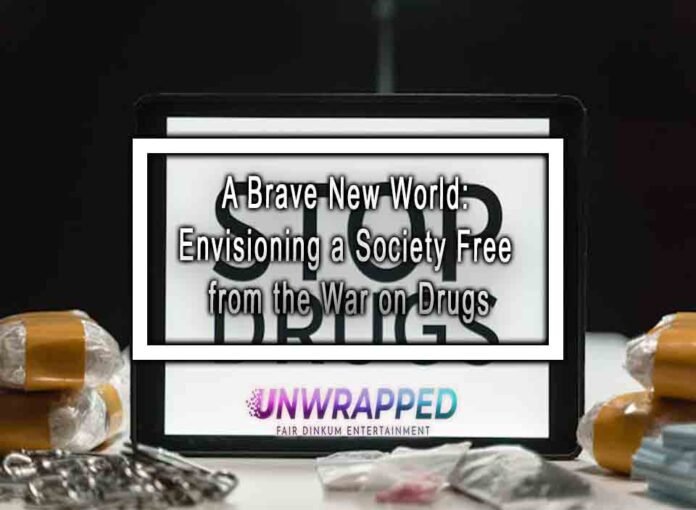The War on Drugs has long shaped policies, economies, and societies, leaving a legacy of mass incarceration, violence, and inequity. Yet as more nations move toward drug legalization, we have an unprecedented opportunity to imagine what a world without punitive drug policies might look like. By prioritizing public health, harm reduction, and equity, a society free from the War on Drugs can offer profound long-term benefits for individuals, communities, and nations.
The Harmful Legacy of the War on Drugs
1. Criminalization and Incarceration
- Impact on Individuals: Harsh penalties for drug possession have disrupted millions of lives, creating cycles of poverty and criminal records that limit opportunities.
- Disproportionate Targeting: Marginalized communities, particularly people of color and low-income individuals, have borne the brunt of enforcement policies.
Statistic: In the U.S., Black Americans are nearly four times more likely to be arrested for marijuana possession than white Americans, despite similar usage rates (American Civil Liberties Union).
2. Economic and Social Costs
- Enforcement Spending: Trillions of dollars have been funneled into law enforcement, incarceration, and interdiction efforts.
- Community Harm: Underfunded social services, over-policing, and stigma have fractured communities.
Example: Incarceration costs in the U.S. alone exceed $80 billion annually, much of it tied to drug-related offenses (The Sentencing Project).
See Also: Australia’s Underground Swingers Scene: Exploring a Hidden World of Connection and Exploration
Envisioning a Post-War on Drugs Society
1. Empowering Individuals
Legalization can transform how we treat substance use, offering compassion and support instead of punishment.
A. Prioritizing Public Health
- Accessible Treatment: A health-focused approach ensures that individuals struggling with addiction receive evidence-based care, reducing dependency and improving outcomes.
- Harm Reduction: Initiatives such as safe consumption sites and naloxone distribution can save lives and reduce stigma.
Case Study: Portugal’s decriminalization policy links individuals with addiction to health services instead of the justice system, resulting in lower overdose and HIV infection rates (Transform Drug Policy Foundation).
B. Restoring Lives
- Expungement of Records: Clearing criminal records for past drug offenses allows individuals to rebuild their lives, gain employment, and contribute to society.
- Reduced Stigma: Legalization shifts the narrative from criminality to public health, empowering individuals to seek help without fear of judgment.
2. Strengthening Communities
A. Economic Reinvestment
Tax revenue from regulated drug markets can directly benefit local communities:
- Education: Fund school programs to improve literacy, critical thinking, and job readiness.
- Healthcare: Expand mental health services, addiction treatment, and preventive care.
- Community Development: Invest in infrastructure, housing, and public transportation.
Example: Colorado’s cannabis tax revenue has funded over $420 million in public school improvements (Colorado Department of Revenue).
B. Social Equity
- Empowering Marginalized Groups: Equity programs can prioritize licenses and funding for communities disproportionately impacted by drug prohibition.
- Reducing Over-Policing: Shifting resources from enforcement to social programs strengthens trust between communities and law enforcement.
3. National Benefits
A. Reducing Organized Crime
- Impact: Legalization undercuts criminal networks by transferring control of the drug trade to regulated markets.
- Example: Uruguay’s state-controlled cannabis market has reduced black market activity while ensuring product safety (Uruguay Drug Observatory).
B. Improving International Relations
- Ending Global Drug Wars: A shift from prohibition to regulation reduces the need for international drug enforcement and the collateral damage it causes.
- Focus on Development: Countries previously destabilized by trafficking can invest in sustainable industries and community well-being.
Another Must-See: Legalization vs. Decriminalization: Understanding the Difference and Why It Matters
A Vision for Future Generations
1. Educated and Empowered Youth
A post-War on Drugs society emphasizes education and prevention:
- Science-Based Curricula: Equip young people with the knowledge to make informed decisions about substance use.
- Delayed Use: Prevention programs reduce early exposure to drugs, minimizing long-term risks.
2. A Healthier Population
Harm reduction and treatment reduce the societal burden of addiction:
- Fewer Overdoses: Safer, regulated products and education campaigns minimize the risk of fatal overdoses.
- Improved Public Health: Legalization supports widespread access to healthcare services, benefiting entire populations.
3. Economic Prosperity
- New Industries: Legalization creates jobs in agriculture, retail, research, and regulation.
- Global Leadership: Countries adopting progressive drug policies position themselves as leaders in innovation and human rights.
Example: Canada’s cannabis industry supports over 150,000 jobs and contributes billions to the national economy (Health Canada).
Addressing Challenges
1. Managing the Transition
- Public Perception: Education campaigns must address misconceptions and fears about legalization.
- Phased Implementation: Gradual rollouts and pilot programs allow policymakers to learn and adjust.
2. Ensuring Equity
- Inclusive Policies: Governments must prioritize marginalized groups in licensing, funding, and reinvestment initiatives.
- Monitoring Outcomes: Continuous evaluation ensures that legalization benefits all communities equitably.
Conclusion: A Brave New World
A society free from the War on Drugs isn’t just about legalizing substances—it’s about reimagining how we approach public health, equity, and justice. In this new world:
- Individuals are supported, not punished, for their struggles.
- Communities thrive as resources are reinvested where they’re needed most.
- Nations lead with compassion and evidence-based policies, creating a blueprint for global change.
The long-term benefits of legalization extend far beyond economics or crime reduction—they create a fairer, healthier, and more inclusive world for everyone.
Meta Information
Meta Title: A Brave New World: Envisioning a Society Free from the War on Drugs
Meta Description:
Keywords: end of War on Drugs, drug legalization benefits, public health and drug policy, social equity and drug reform, global drug policy change, community reinvestment in legalization.
References
- Transform Drug Policy Foundation
Portugal’s Decriminalization Success - American Civil Liberties Union (ACLU)
Racial Disparities in Drug Enforcement - Colorado Department of Revenue
Cannabis Tax Revenue and Public Investment - Uruguay Drug Observatory
Cannabis Regulation and Crime Reduction - Health Canada
Cannabis Industry Economic Impact
Another Must-Read: The History of “Sexual Morality” Laws in Australia: From Convicts to Consent
Australia’s Underground Swingers Scene: Exploring a Hidden World of Connection and Exploration










